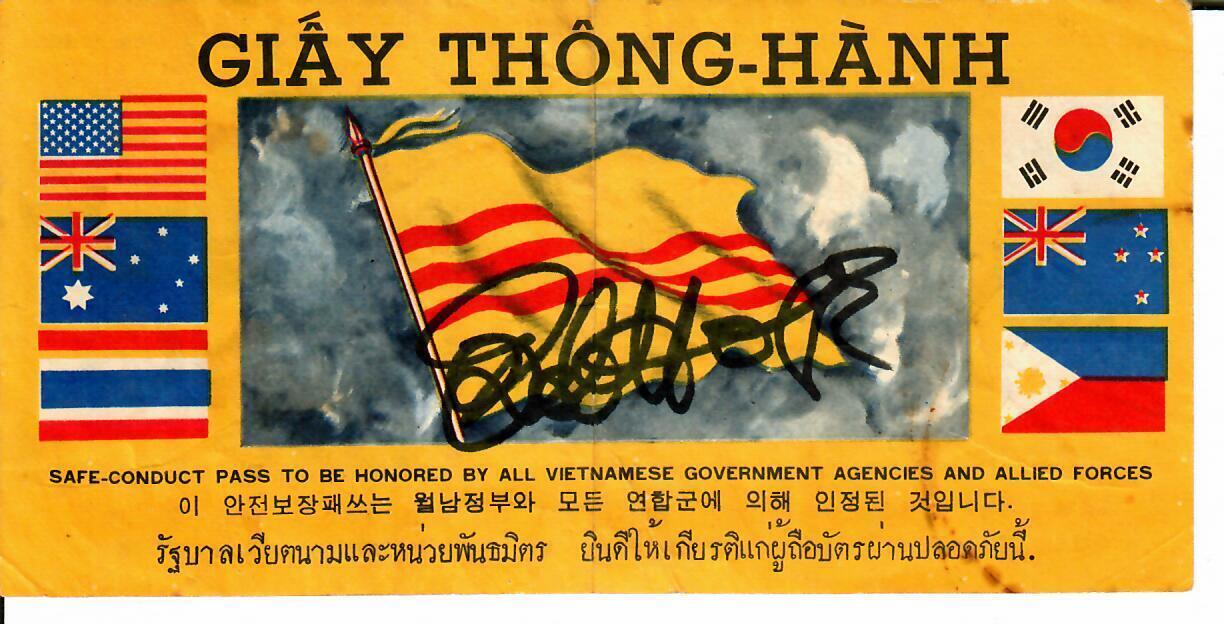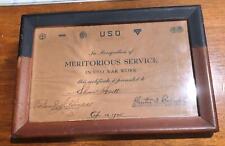RARE “USO” Bob Hope Hand Signed Vietnamese Bill For Sale

When you click on links to various merchants on this site and make a purchase, this can result in this site earning a commission. Affiliate programs and affiliations include, but are not limited to, the eBay Partner Network.
RARE “USO” Bob Hope Hand Signed Vietnamese Bill:
$139.99
Up for sale a RARE! “USO” Bob Hope Hand Signed Vietnamese Bill.
ES-9060E
Leslie 29, 1903 – July 27, 2003) was a
British-American comedian, vaudevillian, actor, singer and dancer. With a career that
spanned nearly 80 years, Hope appeared in more than 70 short and feature films,
with 54 feature films with Hope as star, including a series of seven Road to ... musical comedy movies with Bing Crosby as Hope's top-billed partner. In addition to
hosting the Academy Awards show
19 times, more than any other host,
Hope appeared in many stage productions and television roles and wrote 14
books. The song "Thanks for the Memory"
was his signature tune. Hope was born in the Eltham district of southeast London, arrived in the
United States with his family at the age of four, and grew up near Cleveland, Ohio. After a brief career as a boxer in
the late 1910s, Hope began his career in show business in the early 1920s,
initially as a comedian and dancer on the vaudeville circuit, before acting
on Broadway. Hope began
appearing on radio and in films starting in 1934. He was praised for his
comedic timing, specializing in one-liners and rapid-fire delivery of jokes
that were often self-deprecating. He
helped establish modern American stand-up comedy. Between 1941 and 1991, Hope
made 57 tours for the United Service Organizations,
entertaining active duty U.S. military personnel around the world. In 1997,
the United States Congress passed
a bill that made Hope an honorary veteran of the U.S. Armed Forces. He also appeared in numerous television
specials for NBC during his career and was one of the first users
of cue cards. Hope retired from public life in 1998 and died on
July 27, 2003, at the age of 100 in his Toluca Lake home. Leslie Townes Hope was born on May 29,
1903, in Eltham, County of London (now part of the Royal Borough of Greenwich),
in a terraced house on Craigton Road in Well Hall, where there is now a blue plaque in his memory. He was the fifth of seven sons of an English
father, William Henry Hope, a stonemason from Weston-super-Mare, Somerset, and a Welsh mother, Avis (née
Townes), a light opera singer from Barry, Vale of Glamorgan, who later worked as a cleaner. William and Avis
married in April 1891 and lived at 12 Greenwood Street in Barry before moving
to Whitehall, Bristol, and
then to St George, Bristol. After
a brief period living in Southend Road, Weston-Super-Mare, in 1908, the family emigrated to the United
States, sailing aboard the SS Philadelphia.
They passed through Ellis Island, New York on March 30, 1908,
before moving on to Cleveland, Ohio. From age 12, Hope earned
pocket money by busking (frequently on the streetcar
to Luna Park), singing,
dancing, and performing comedy. He entered numerous dancing and amateur talent
contests as Lester Hope, and won a prize in 1915 for his impersonation of Charlie Chaplin. For a time, he attended the Boys' Industrial
School in Lancaster, Ohio, and as an
adult donated sizable sums of money to the institution. Hope had a brief career as a boxer in 1919,
fighting under the name Packy East. He had three wins and one loss, and he
participated in a few staged charity bouts later in life. Hope worked as a
butcher's assistant and a lineman in his teens
and early 20s. He also had a brief stint at Chandler Motor Car Company.
In 1921, while assisting his brother Jim in clearing trees for a power company,
he was sitting atop a tree that crashed to the ground, crushing his face; the
accident required Hope to undergo reconstructive surgery, which contributed to
his later distinctive appearance. After deciding on a show business career,
Hope and his girlfriend signed up for dancing lessons. Encouraged after they
performed in a three-day engagement at a club, Hope formed a partnership with
Lloyd Durbin, a friend from the dancing school. Silent film comedian Fatty Arbuckle saw them perform in 1925 and found them work
with a touring troupe called Hurley's Jolly Follies. Within a year, Hope had
formed an act called the "Dancemedians" with George Byrne and
the Hilton Sisters, conjoined twins who
performed a tap-dancing routine on the vaudeville
circuit. Hope and Byrne also had an act as Siamese twins; they sang and danced
while wearing blackface until friends advised Hope
he was funnier as himself. In 1929, Hope informally changed his first name to
"Bob". In one version of the story, he named himself after racecar
driver Bob Burman. In another, he said he chose the name because
he wanted a name with a "friendly 'Hiya, fellas!' sound" to it. In a 1942 legal document, his legal name
appears as Lester Townes Hope; it is unknown if this reflects a legal name
change from Leslie. After five years on the vaudeville circuit,
Hope was "surprised and humbled" when he failed a 1930 screen test
for the French film production company Pathé at Culver City, California.

Related Items:
RARE “USO” Bob Hope Hand Signed Vietnamese Bill
$139.99
RARE “USO” Bob Hope Hand Signed Vietnamese Bill
$139.99
1945 USO Merit Service Award War Work WWII Signed Plaque RARE
$105.00



